
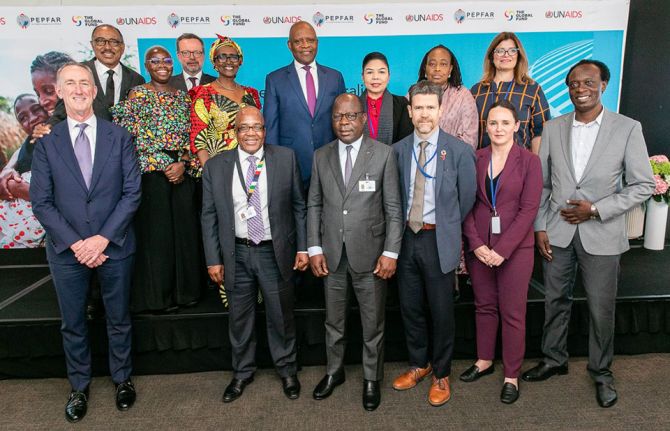
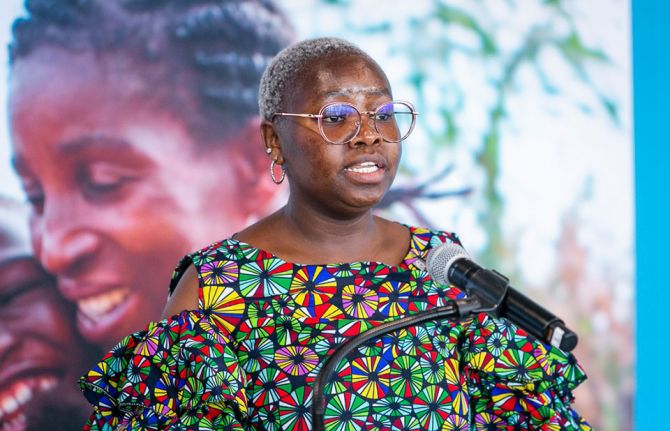
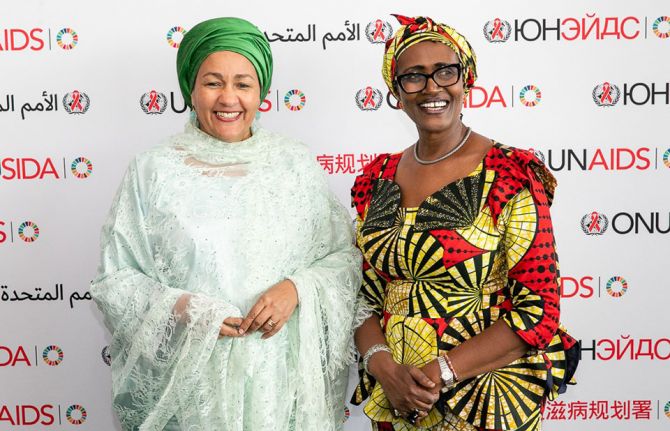
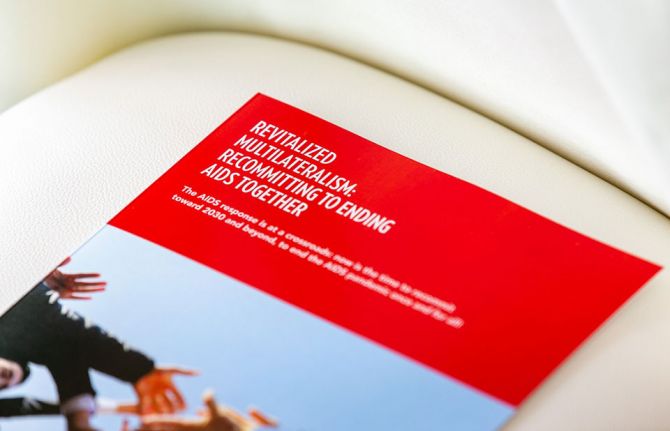
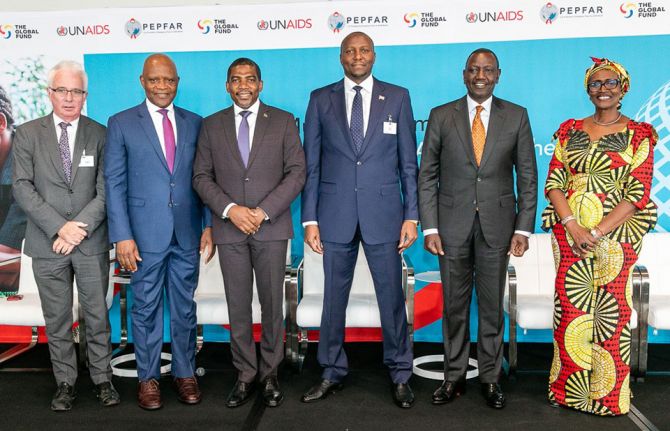
Press Release
Leaders pledge bold action to end AIDS by 2030
24 September 2024 24 September 2024Global leaders unite to recommit to ending AIDS during the 79th United Nations General Assembly in New York
NEW YORK/GENEVA, 24 September 2024—The extraordinary advances made in the global HIV response are a success story of multilateralism. At the end of 2023, 30.7 million people out of a total of 39.9 million people living with HIV worldwide were on life-saving treatment — four times higher than the 7.7 million who were on treatment in 2010. Since 2010, AIDS-related deaths have been halved and new HIV infections among children have been reduced by 62%.
At a special event at the UN General Assembly, co-convened by the Joint United Nations Programme on HIV/AIDS (UNAIDS), the United States President’s Emergency Plan for AIDS Relief (PEPFAR) and the Global Fund to Fight AIDS, Tuberculosis and Malaria, leaders pledged to sustain and accelerate investments, political leadership and policy reforms that will continue the momentum needed to end AIDS and sustain progress beyond 2030.
UNAIDS data shows that the end of AIDS as a public health threat is achievable by 2030, if countries, communities and partners close the gaps holding back progress.
The United Nations Deputy General-Secretary, Amina Mohammed, said the AIDS movement stood out as a beacon of hope and resilience and thanked leaders for committing to end AIDS by 2030: “The AIDS response has been a powerful testament to what is achievable when leaders unite, when communities are empowered, when inequalities are tackled, human rights are protected and when science-based policy is backed by political will.”
UNAIDS Executive Director Winnie Byanyima told the leaders making commitments, “you have proven the power of global solidarity, you have shown that multilateralism is not a theory – it is the way we save lives and keep the world secure. Ending AIDS is a political and financial choice. Today I am confident that you will make it a reality.”
Jerop Limo, a young Kenyan activist living with HIV, reminded leaders about the life-changing impact of progress in the HIV response: “As world leaders, your achievement in the HIV response is not only measured in numbers. Those numbers are me.”
Countries, communities and partners from around the world shared renewed commitments, include ensuring HIV prevention and treatment reaches everyone in need; ending HIV-related stigma and discrimination; accelerating research and innovation; and mobilizing additional domestic resources for HIV to sustain the progress in the HIV response.
A selection of quotes from leaders
President George W. Bush, in a video message recorded for the event, emphasized the need for steadfast commitment to reach global goals:
“In 2003, my administration launched PEPFAR with bipartisan support from Congress. Nearly 22 years later, PEPFAR has saved more than 25 million lives, and more than 5 million babies have been born HIV free. We are on the verge of an AIDS-free generation but at this critical moment the people of Africa still need our support. We should be proud of PEPFAR’s tremendous successes, and we should keep going until the job is done.”
William Ruto, President of Kenya:
“The undeniable success and impact of Kenya’s response to HIV demonstrates the potential of strong partnership. I must emphasize that our steadfast commitment to multilateralism has been the cornerstone of these achievements, enabling us to implement high impact interventions that have saved lives.”
Russell Dlamini, Prime Minister of Eswatini:
“The HIV response is our collective responsibility. Our journey is far from over and HIV/AIDS remains unfinished business. The 2030 target of ending AIDS as a public health threat may not be achieved unless we revitalize multilateralism and multisectoral approaches. Predictable and sustained funding for HIV/AIDS must be increased. Today I would like to take this opportunity to ask all stakeholders to recommit to supporting the HIV response.”
Terrance Michael Drew, Prime Minister of St Kitts and Nevis:
“It will be challenging for the Caribbean to maintain the gains we have made without the continued relationship with the international community. We have gained much but if we take our eyes off the ball we can lose much and what we have gained we should try not to lose. We cannot take our foot off the pedal but must continue to press until we get to the point where HIV/AIDS is no longer a public health crisis.”
John Nkengasong, Ambassador-at-Large and Coordinator of United States Government Activities to Combat HIV/AIDS Globally:
“We cannot be tired in the fight against HIV/AIDS. HIV/AIDS will not be tired with us. It is here with us. On behalf of PEPFAR we are committed to sustaining people on life saving treatment. Second, we are committed to working in partnership with everyone here to ensure we close the inequity gaps.”
Peter Sands, Executive Director of the Global Fund to fight AIDS, TB and Malaria:
“Two decades ago, AIDS was claiming millions of lives with devastating consequences for families and communities around the world. Together, we joined forces and rejected this injustice, forcing this disease into retreat. That remarkable progress we have made can be an inspiration for ending AIDS as a public health threat for good. It is a goal within our grasp. That requires reaching all people in need of HIV prevention and treatment services and breaking down all barriers to health services.”
Ms. Minata Cessouma Samate, African Union Commissioner for Health, Humanitarian Affairs & Social Development:
“There has been major progress in the last four decades of the AIDS response but to end AIDS this commitment must continue. On the African continent we need continued engagement and funding—for primary healthcare and to end AIDS. The AU commission is engaged but we need international support to ensure that everyone has access to quality HIV treatment and healthcare services and we need the transfer of technologies to be able to produce quality treatments on the continent. It is multilateralism that will allow us to end AIDS in Africa.”
Dr. Aaron Motsoaledi, Minister of Health of South Africa:
“South Africa has the largest burden of HIV in the world with 7.8 million people living with HIV and 5.8 million are on antiretroviral treatment, and we are in the process of putting 2 million more people on treatment. With domestic financing and with solidarity from multilateralism we are very confident that we can end AIDS by 2030.”
Dr. Shrimati Anupriya Patel, Minister of State for Health of India:
“This platform emphasizes the multilateralism needed to achieve the SDG goal of ending AIDS as a public health threat by 2030. Breaking the silence and building synergies is the mantra of the government of India and we are committed to achieving the target of ending AIDS as a public health threat by 2030. It is imperative to consolidate the gains made in this journey. I’m confident that with our collective efforts and genuine partnerships, we can build a future towards a healthier world.”
Mr. Pierre Dimba Minister of Health of Côte d’ Ivoire, Public Hygiene and Universal Health Coverage:
“Today’s focus on multilateralism is critical, because multilateralism has enabled important progress in the fight against AIDS. But the last few miles will be difficult because the challenges are many. We have put in place a plan, including a financing plan and have strengthened our surveillance systems and integrated health services which allows us to work more globally in our approach to HIV prevention, testing and treatment. But we need support from partners to strengthen our capacities and to allow us to benefit from new innovations so that our country isn’t left behind.”
Dame Emma Walmsley, Chief Executive Officer, GSK:
“Our commitment to get ahead of HIV together and ending the AIDS epidemic by 2030 is underpinned by three simple priorities. First, we believe in innovation, inspired by what matters most to the people that we serve. We are developing longer acting options exploring new types of innovative drugs that offer the option to treat at home and our focus on finding a cure is relentless. Secondly, we are committed to enabling access to our medicines, there is no point in innovation without it, regardless of who you are or where you live. Lastly, and that is what this is all about here today, we get ahead of disease together with the power of partnership. Working across sectors we enable the fastest rollout of a child friendly treatment now available in 90 countries and our commitment to communities is unwavering.”
Daniel O'Day, Chief Executive Officer, Gilead Sciences:
“Upon approval our intention is to make Lenacapavir available at no profit to Gilead in the countries where the need is greatest and until voluntary licensing partners can supply high-quality low-cost versions. We are working around the clock to finalize the direct voluntary licensing costs agreements that will facilitate rapid transfer of technology, allow Gilead to support licensees and getting up to speed quickly and help provide a robust network of manufacturers that is able to produce high volumes at competitive costs. It is my great hope and belief that we are on the brink of the next great advancement in the global fight to end HIV/AIDS.”
Silas Holland, Executive Director, Infectious Disease and Neuroscience Policy, Merck:
"Since 1985, Merck has been engaged in research and development efforts that have led to significant discoveries transforming the way that HIV is treated. The company is committed to continuing to invest in all stages of R&D to discover, develop and enhance access to innovative HIV treatments and prevention options, as well as developing novel agents for a cure, aiming to improve the lives of people living with HIV. Merck remains committed to collaborative efforts to end AIDS as a public health threat by 2030."
Rev. Gibstar Makangila, Executive Director, Circle of Hope, and Faith Representative, Zambia:
“Our commitment in the faith community and faith-based organizations is that by 2050 we expect 1 billion young people to be living in Africa. What are we going to do about that? What we propose is a new energy, a new engagement that is based on equity, love, tolerance and inclusiveness. As faith-community we are cognizant of the changing dynamics on the ground and therefore our commitment is that we will support all programmes based on an inescapable responsibility and also empathy, compassion, integrity, passion and ethics.”
Ms. Youk Sambath, Secretary of State, Ministry of Health, Cambodia:
“Cambodia has made huge progress in its national AIDS response. New HIV infections have been reduced by 46% and AIDS deaths by 36% from 2010 to 2023. Cambodia is one of seven countries worldwide to first reach the targets of 90-90-90 in 2017. I thank PEPFAR, the Global Fund, UN agencies and UNAIDS, without whom these results would not have been possible.”
Ms. Laura Rissanen, State Secretary, Ministry of Social Security, Finland:
“Today we are still facing many challenges—the global HIV response is at a crossroads and there is no time to waste. The ambitious goal to end AIDS by 2030 as a public health threat can only be achieved by putting human rights and gender equality at the core of HIV response efforts. Finland is strongly committed to enhancing human rights, in particular the rights of women and girls, LGBTQI people, and people living with HIV. We therefore value and support the human rights advocacy efforts of UNAIDS. We must all continue to pull together in these difficult times to ensure that we will reach the finish line leaving no-one behind.”
Mr. George Ternes, Director General for Development Cooperation and Humanitarian Aid, Ministry of Foreign Affairs, Luxembourg:
“We have all the tools and knowledge. We have everything we need to end AIDS by 2030. The message is that Luxembourg will be there. You can count on our continued support. It is normal that at the end of a fight, you confront the most difficult task. Now there are some really critical ones and the stigma that keeps you from living a normal life in society because you are under treatment for HIV/AIDS – it’s still existing, it’s a major obstacle.”
Ms. Carina Connellan, Director of the Multilateral Unit in the Development Cooperation and Africa Division, Department of Foreign Affairs of Ireland:
“UNAIDS is a longstanding and highly valued partner of Ireland. Ireland is committed to HIV prevention, especially for those at risk including adolescent girls and young women. Health systems strengthening is a priority for Ireland and we know that effective collaboration among global health actors is vital for strong and resilient health systems. It is very important to acknowledge successes, but we know that significant challenges remain. Ireland’s focus will be very much on reaching those who are furthest behind first. Ireland will continue to be a close partner of UNAIDS, and we will work together with affected communities and all stakeholders to end AIDS.”
Mr. Jean Bernard Parenteau, DG for Health and Nutrition, Global Affairs Canada:
“What really concerns us is the increased vulnerability of women and girls due to the stigma of accessing sexual and reproductive health services, which continues to threaten progress. This is one of the reasons that motivates Canada to commit to making the Global Fund replenishment a success. This also motives Canada to continue its 10-year commitment to global health and rights in the fight against AIDS. Comprehensive sexual and reproductive health and rights are key to the AIDS response. With a feminist approach, a rights-based approach, Canada is committed to 2030 and beyond.”
Mr. Haoliang Xu, Associate Administrator, UNDP, on behalf of UNAIDS co-sponsors:
“The Summit of the Future is about the future of multilateralism, so this is the first concrete step to follow up on the implementation of the pact for the future. For HIV we know the job is not done. Every minute someone dies of AIDS and 1.3 million new HIV infections occur every year so there is a lot still to be done. The co-sponsors of UNAIDS commit to multilateralism and to ending HIV as a public health threat by 2030 and to sustain progress beyond 2030. We are committed to scaling up programmes to achieve results because HIV is about livelihoods, it’s about rights and it’s about dignity. We are committed to working effectively to achieve the task we set out to achieve.”
The quotes shared above are only a sample from an event which featured commitments by dozens of leaders which are being compiled. UNAIDS will continue to update and share details.
UNAIDS
The Joint United Nations Programme on HIV/AIDS (UNAIDS) leads and inspires the world to achieve its shared vision of zero new HIV infections, zero discrimination and zero AIDS-related deaths. UNAIDS unites the efforts of 11 UN organizations—UNHCR, UNICEF, WFP, UNDP, UNFPA, UNODC, UN Women, ILO, UNESCO, WHO and the World Bank—and works closely with global and national partners towards ending the AIDS epidemic by 2030 as part of the Sustainable Development Goals. Learn more at unaids.org and connect with us on Facebook, Twitter, Instagram and YouTube.
Contact
UNAIDSSophie Barton Knott
tel. +41 79 514 6896
bartonknotts@unaids.org
UNAIDS
Michael Hollingdale
tel. +41 79 500 2119
hollingdalem@unaids.org
